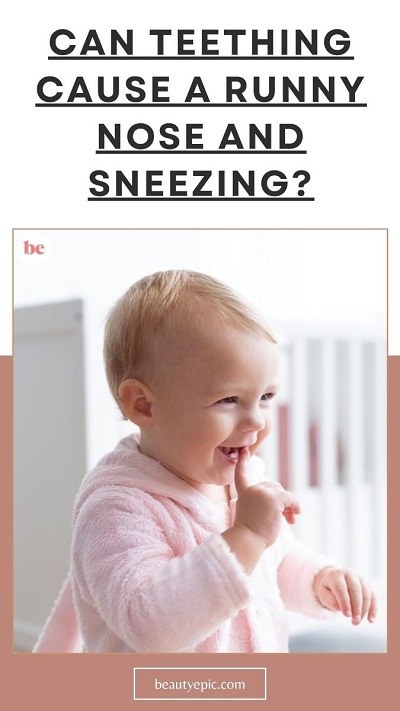
Important: This article is for informational purposes only. Please read our full disclaimer for more details.
Most times, people relate teething with a running nose, fever, irritability, or pain. However, the scientific belief behind such notions is different. If you have little munchkins at home and wonder can teething cause runny nose, this article will describe the usual symptoms of teething and all causes of a runny nose in children.
Why Does Teething Cause Runny Noses in Children?

Teething is a process in which an infant’s tooth comes out through the gums. This might lead to some symptoms like fussiness, discomfort, or fever (1).
Teething is usually blamed for not just a running nose but several other things in an infant’s life, like sleepless nights, rosy cheeks, etc., but is it really normal to link teething with a running nose? Or rather, how do you understand if the baby’s running nose is just a symptom of teething or other reasons like cold?
There are various reasons that cause a runny nose in children. Usually, the stress associated with teething may be a reason for a child’s runny nose but not teething itself (2).
An infant usually starts getting teeth between 6-8 months. Teething may be accompanied by other symptoms like fever, pain, or annoyance. During tooth eruption, parents and caregivers may notice changes in the behavioral pattern of a child. Some parents have also noticed diaper rash or diarrhea in their children. Some experts believe that infants become vulnerable to infections during the teething period that may cause the show of these symptoms.
The immunity of the body changes during this period as the child’s inborn immunity might start decreasing during this period. Also, at this time, babies come in close contact with a lot of things due to their movement and hence become more exposed to viruses and bacteria. They also tend to chew on things during the teething process, which makes them susceptible to childhood illnesses.
Reasons Why Teething and Running Nose May Occur at the Same Time
There are two main reasons why teething and running nose may occur simultaneously:
- Loss of antibodies: When infants are 6-12 months old, they tend to naturally lose the antibodies transferred to them by their mothers during birth (3). Hence, the immune system responds quickly to all the infections.
- Increased exposure to new pathogens: At the age of 6-12 months, infants have the habit of sucking and chewing objects lying around them as they explore the world. This exposes them to a wide range of pathogens that may cause frequent illnesses.
Regular Teething Symptoms
Teething symptoms vary in children. While some may experience all of it, and it might be painful, for others, it may be a mild symptom with less pain.
The journal of the American Academy of Pediatrics found that there are some symptoms of teething that are consistent in most children while teething, especially on the day the tooth pops out and the day after (4). The main symptoms of teething are:
- Fussiness
- Drooling
- Gum pain
- Face rashes due to constantly holding objects and chewing desire
- Excessive crying
- Fever
- Loss of appetite
- Diarrhea
- Disturbed sleeping pattern
- Vomiting
- Coughing
- Irritation
All these symptoms may sometimes be associated with a running nose in children. Like when a child cries excessively, tears may pass through the nasal cavity and into the nose, causing it to run.
How to Soothe Sore Gums
To comfort an infant’s teething discomfort, the parents and caregivers can try the following ways:
- Nursing the baby continuously. The babies naturally tend to feel comfortable when the mother is breastfeeding.
- Using a clean finger to rub the gums gently. The infant may feel pain due to tooth eruption. Gently massaging the gum may soothe the infant.
- Giving a safe teething ring, preferably without a liquid.
Teething Treatments to Avoid
Some methods should not be brought into practice while a child is teething. These include frozen teething rings, teething creams and gels, teething beads, teething necklaces and bracelets, etc. These may cause the baby to choke on them.
When Should You Visit a Doctor?
A baby who is inconsolable creates anxiety in parents. Quite a number of babies undergo many symptoms together during the teething period. At such times, they need to be taken to a doctor so that medicines to smoothen the pain in the gum can be provided.
Conclusion
People often associate teething with a running nose. However, there is no evidence to prove that teething is a cause of running nose. The extra discharge around the tooth may cause inflammation and, hence, discomfort.
Running nose may be caused due to several other factors, and hence, medical attention is needed at the right time to diagnose the cause and provide optimum treatment.
If the baby is terribly upset, do not rely on home medicines. Instead, make an appointment with the doctor to seek medical attention.
Image Source : freepik
Related Articles
- Headache And Nosebleed: Causes, Treatment, And Prevention Tips
- Does Ice Make Your Nose Smaller?
- Red Spot On Nose: Causes And Treatments
- Why Do I Wake Up with a Stuffy Nose?
- 10 Easy Ways To Clear Stuffy Nose With Home Remedies
- The 8 Best Essential Oils for Stuffy Nose
- Yoga for Sinus: 6 Best Yoga Poses for Sinus Relief
- How to Get Rid of Blackheads on Nose Naturally at Home?
- How to Get Rid of Scabs in Nose, Causes, Treatment, Remedies?
- Home Remedies to Whiten Teeth Fast
- How to Whiten Your Teeth Naturally at Home
- How To Whiten Your Teeth With Baking Soda – 7 Best Ways
- 7 Best Teeth Whitening for Sensitive Teeth
- 7 Best Toothpastes For Sensitive Teeth
- What Causes Gum Growing Between Teeth & How To Correct It?
- How To Get Rid Of Cavities Using Baking Soda
- Baking Soda & Lemon Juice for Teeth Whitening
- When Can I Eat Chips After Wisdom Teeth Removal?
- Can I Eat Rice After Tooth Extraction?
- What Causes Itchy Gums In between Teeth
- Why Do My Teeth Hurt When I Wake Up?
















